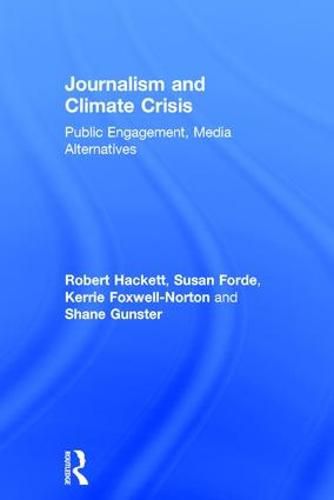Readings Newsletter
Become a Readings Member to make your shopping experience even easier.
Sign in or sign up for free!
You’re not far away from qualifying for FREE standard shipping within Australia
You’ve qualified for FREE standard shipping within Australia
The cart is loading…






Journalism and Climate Crisis: Public Engagement, Media Alternatives recognizes that climate change is more than an environmental crisis. It is also a question of political and communicative capacity.
This book enquires into which approaches to journalism, as a particularly important form of public communication, can best enable humanity to productively address climate crisis. The book combines selective overviews of previous research, normative enquiry (what should journalism be doing?) and original empirical case studies of environmental communication and media coverage in Australia and Canada. Bringing together perspectives from the fields of environmental communication and journalism studies, the authors argue for forms of journalism that can encourage public engagement and mobilization to challenge the powerful interests vested in a high-carbon economy - ‘facilitative’ and ‘radical’ roles particularly well-suited to alternative media and alternative journalism. Ultimately, the book argues for a fundamental rethinking of relationships between journalism, publics, democracy and climate crisis.
This book will interest researchers, students and activists in environmental politics, social movements and the media.
$9.00 standard shipping within Australia
FREE standard shipping within Australia for orders over $100.00
Express & International shipping calculated at checkout
Journalism and Climate Crisis: Public Engagement, Media Alternatives recognizes that climate change is more than an environmental crisis. It is also a question of political and communicative capacity.
This book enquires into which approaches to journalism, as a particularly important form of public communication, can best enable humanity to productively address climate crisis. The book combines selective overviews of previous research, normative enquiry (what should journalism be doing?) and original empirical case studies of environmental communication and media coverage in Australia and Canada. Bringing together perspectives from the fields of environmental communication and journalism studies, the authors argue for forms of journalism that can encourage public engagement and mobilization to challenge the powerful interests vested in a high-carbon economy - ‘facilitative’ and ‘radical’ roles particularly well-suited to alternative media and alternative journalism. Ultimately, the book argues for a fundamental rethinking of relationships between journalism, publics, democracy and climate crisis.
This book will interest researchers, students and activists in environmental politics, social movements and the media.